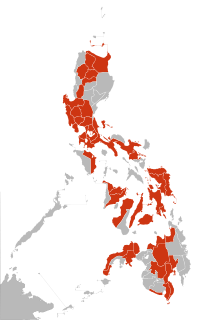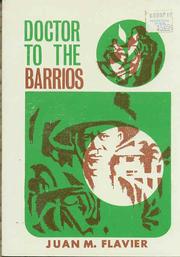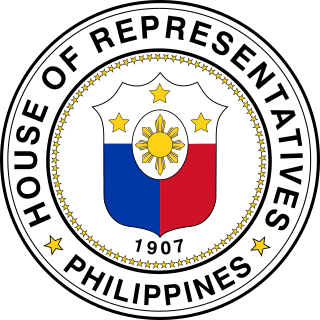 W
WIn response to the Millennium Development Goals' focus on maternal and child health, the Philippines began the National Demographic and Health Survey in 1968 to assess the effectiveness of public health programs in the country.
 W
WThe 2009 flu pandemic in the Philippines began on May 21, 2009 when a young Filipina girl first contracted the A(H1N1) virus while in the United States. In the following days, several local cases were reported to be caused by contact with two infected Taiwanese women who attended a wedding ceremony in Zambales.
 W
WThe Department of Health is the executive department of the government of the Philippines responsible for ensuring access to basic public health services by all Filipinos through the provision of quality health care, the regulation of all health services and products. It is the government's over-all technical authority on health. It has its headquarters at the San Lazaro Compound, along Rizal Avenue in Manila.
 W
WThe Food and Drug Administration (FDA) of the Philippines, formerly the Bureau of Food and Drugs, is a health regulatory agency under the Department of Health created on 1963 by Republic Act No. 3720, amended on 1987 by Executive Order 175 otherwise known as the “Food, Drugs and Devices, and Cosmetics Act”, and subsequently reorganized by Republic Act No. 9711 otherwise known as “The Food and Drug Administration Act of 2009”. The agency is responsible for licensing, monitoring, and regulation of cosmetics, drugs, foods, household hazardous products, medical devices and electromagnetic radiation emitting devices, pesticides, tobacco and related products, and vaccines for safety, efficacy, and quality in the Republic of the Philippines.
 W
WDoctor to the Barrios is a 1970 book written by Juan M. Flavier, a physician in the Philippines, who later became Secretary of the Department of Health and two-term Senator of the Philippines. Its complete title is Doctor to the Barrios, Experiences with the Philippine Rural Reconstruction Movement.
 W
WFilipino shamans, commonly known as Babaylan were shamans of the various ethnic groups of the pre-colonial Philippine islands. These shamans specialized in communicating, appeasing, or harnessing the spirits of the dead and the spirits of nature. They were almost always women or feminized men. They were believed to have spirit guides, by which they could contact and interact with the spirits and deities and the spirit world. Their primary role were as mediums during pag-anito séance rituals. There were also various subtypes of babaylan specializing in the arts of healing and herbalism, divination, and sorcery.
 W
WThe Inter-Agency Task Force for the Management of Emerging Infectious Diseases (IATF-EID) is a task force organized by the executive of the government of the Philippines to respond to affairs concerning emerging infectious diseases in the country.
 W
WExecutive Order No. 26, entitled Providing for the Establishment of Smoke-Free Environments in Public and Enclosed Places, was issued by Philippine President Rodrigo Duterte on May 16, 2017. This executive order invoked the Clean Air Act of 1999 and the Tobacco Regulation Act of 2003 to impose a nationwide ban on smoking in all public places in the Philippines. The ban replicates on a national level an existing ordinance in Davao City that Duterte created as mayor in 2002. The order took effect on July 23, 2017, 60 days after its publication in a newspaper.
 W
WThe Philippine House Committee on Health, or House Health Committee is a standing committee of the Philippine House of Representatives.
 W
WThe Philippine Senate Committee on Health and Demography is a standing committee of the Senate of the Philippines.
 W
WThe Responsible Parenthood and Reproductive Health Act of 2012, also known as the Reproductive Health Law or RH Law, and officially designated as Republic Act No. 10354, is a Philippine law that provided universal access to methods on contraception, fertility control, sexual education, and maternal care in the Philippines.
 W
WTobacco smoking in the Philippines affects a sizable minority of the population. According to a 2009 survey conducted under the auspices of the Philippines' Department of Health, Philippine Statistics Authority, the World Health Organization, and the United States Centers for Disease Control and Prevention, 28.3 percent of the population are "current tobacco smokers". This figures represents 17.3 million of 61.3 million adult Filipinos.
 W
WThe 2015 Southeast Asian haze was an air pollution crisis affecting several countries in Southeast Asia, including Brunei, Indonesia, Malaysia, Singapore, southern Thailand, Vietnam, Cambodia and the Philippines.